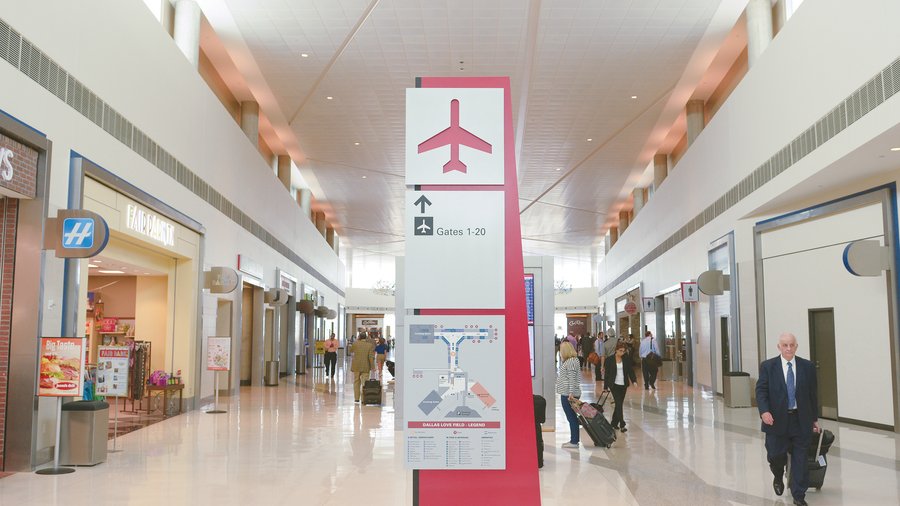In another attempt to solve the ongoing controversy at Dallas Love Field Airport, the city of Dallas crafted a resolution that, if enacted, would force Alaska Airlines to accommodate additional flights Delta wants to fly out of Love Field.
Additionally, Southwest would have to continue to allow Delta to fly its five daily flights out of Gate 15. Both of the forced accommodations would occur for a minimum of three years, the city said in the court filing. This proposed resolution comes in the form of a supplement to the city's earlier motion for summary judgement.
In the court filing, the city acknowledged that all the parties involved — Southwest Airlines Co. (NYSE: LUV), Delta Air Lines, Inc. (NYSE: DAL) and Alaska Air Group, Inc. (NYSE: ALK) — will likely oppose the city's idea.
The city added that if Delta doesn't want to have the eight additional flights it requested flown out of Alaska's gates, it would seek out other airlines to operate on Alaska's gates during times of underutilization.
"This proposal falls short of accommodation to ensure ongoing access and competition at Love Field on a long-term basis," Delta spokesman Morgan Durrant said in a statement to the Dallas Business Journal in response to the new filing, adding that the airline will respond to city fully via court filings in the near future.
Southwest, Alaska and Dallas' interim city attorney, Christopher Caso, declined to comment.
Three-year battle
This disagreement started when Southwest leased two gates at Love Field from United Continental Holdings Group, Inc. (NYSE: UAL). While United operated the gates, Delta had an agreement to fly five daily flights back to its hub in Atlanta.
When Southwest took over the gates, it tried to kick Delta out of Gate 15, but Delta refused to leave. Fearing retaliation from whatever side ended up losing, the city sued involved parties and asked the court to decide what to do. That was back in June 2015.
After years of litigation, earlier this year the city proposed a solution to the conflict. It said in an April motion that Delta would be allowed to keep flying its five daily flights out of Gate 15 for three years. After that time expired, the city could replace Delta.
In last week's filing, the city said there have been additional developments in the case which it sought to address with the new motion.
What's new?
Those new circumstances include Southwest adding capacity to Love Field and Alaska reducing its schedule out of the airport. Southwest controls 18 gates at Love Field, while Alaska inherited the other two after it acquired Virgin America.
In June, Southwest said it was adding 15 daily flights out of Love Field for a total of 195 a day. The Dallas airline said it would have added more if not for the squabble with Delta.
Then, in August, Alaska announced it was reducing its Love Field operations to just 13 daily flights in its two gates.
Delta has long been telling the court that in addition to keeping its five daily flights to Atlanta, it wants to add eight more flights out of Love Field. It has accused Southwest of running a monopoly out of Love Field, saying previously that without court intervention, "Love Field will become Southwest Field, situated at the end of Herb Kelleher Way (formerly Cedar Springs Road)," referencing how the street name was changed to honor Herb Kelleher, Southwest's founder.
To comply with Delta's request for eight more flights, Dallas looked at Southwest's and Alaska's flight schedules.
Southwest was jammed packed, while Alaska had some gaps throughout the day where they weren't using their gates. Three of Delta's requested additional flights could be squeezed into one Alaska gate and the other five could go on the other Alaska gate, the city said in the filing.
"The city’s proposed policy provides that a forced accommodation will last for a minimum of three years," the city said in the filing. "If Virgin/Alaska is directed to accommodate Delta, the length of the accommodation will be for three years. This would also be true for any forced accommodation imposed on Southwest. If ordered today, Delta would be effectively accommodated until 2022."
The city added that only if Southwest or Alaska expanded its operations at Love Field by that time would Delta be required to alter its operations.
Other airlines at Love Field?
In an interesting twist, the city added that if Delta refuses to have its eight flights accommodated on Alaska's gates (it previously said it wants to be accommodated on Southwest's gates) the city could seek other airlines to fill the time gaps currently existing at Alaska's two gates.
"It would promote the full utilization of a valuable city asset, introduce more competition by adding another airline, provide a greater variety of consumer products for the Dallas area traveling public, and not negatively impact Virgin/Alaska’s current operations or immediate future plans," the city said.
Additional flights out of Love Field would interest other airlines, as the airport is limited to just 20 gates and is located in one of the fastest-growing major cities in the country. For reference, Dallas Fort Worth International Airport has 165 gates, according to its website.
If the parties can't reach a settlement, they will have to wait longer for a conclusion to this saga. In a separate filing last week, the court ordered the trial be pushed back from February 2019 to September 2019.




